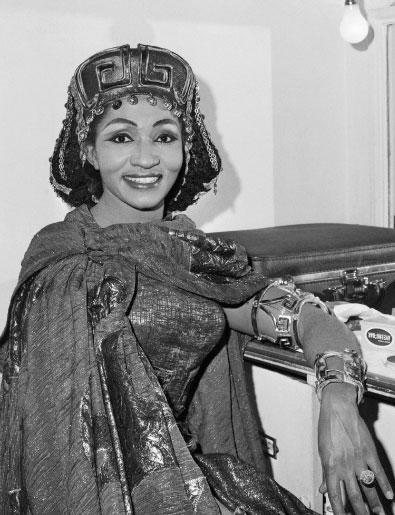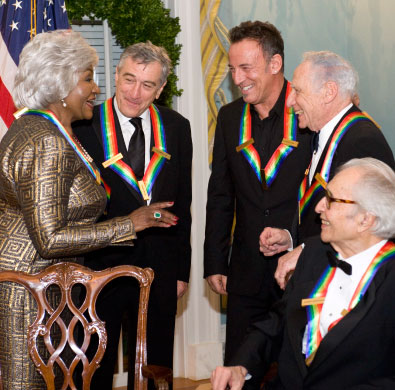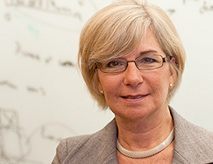Amazing Grace
In five decades,
Grace Bumbry’s career has soared, from Wagner to Scott Joplin
By Susan Seligson
Offstage Grandeur
Retired mezzo-soprano Grace Bumbry against the operatic backdrop of the Felsenreitschule at Salzburg, Austria. Photo by Andrea Artz
The exact number of curtain calls — thirty-two or forty-two? — has blurred with time, but a half century has done nothing to dull the historic impact of the moment when young mezzo-soprano Grace Bumbry broke the color barrier at the 1961 Bayreuth Festival.

Grace Bumbry in January 1968 in her dressing room at the Royal Opera House, Covent Garden, London, where she sang the role of Amneris in Verdi’s Aïda. AP Photo / Staff / Harris
The self-assured beauty from St. Louis, Missouri, knocked the socks off a throng of tight-jawed Wagnerians, conservative opera-goers who had huffed that Bumbry’s casting as Venus in the production of Tannhaüser was a cultural outrage. But her role as the goddess of love thrilled Wieland Wagner, the composer’s grandson, who declared that Wagner “would have been delighted. He wrote for vocal color, not skin color.”
Bumbry and her audience have enjoyed one of the richest operatic careers of the twentieth century. In her heyday she belonged to that rare opera breed — the mezzo-soprano superstar, taking her place in the firmament because of her riveting stage presence as well as her versatile voice.
“Her big break was singing Venus at Bayreuth,” says Richard Dyer, who retired recently after thirty-three years as classical music critic for the Boston Globe. “That was the holiest of holies, playing a major Wagner role.”
Now seventy-three, Bumbry (CFA’55) was celebrated in December with a Kennedy Center Honor, along with Bruce Springsteen, Robert De Niro, Dave Brubeck, and Mel Brooks. This spring, she was lured out of retirement to perform the role of the mother in a production of Scott Joplin’s Treemonisha at the Théâtre du Châtelet in Paris, the city where she made her debut fifty years ago. She sang Amneris in Verdi’s Aïda, at the Grand Opera, a year before Bayreuth.
Bumbry could not pass up the chance to be a part of the Joplin opera, a century after it was composed, heading an all-black cast from the United States and Africa. In Treemonisha, set in 1884, an adopted daughter of an Arkansas plantation manager tries to wrench her people free from ignorance and superstition. Joplin, who died of syphilis in 1917, never saw a full production of Treemonisha, which wasn’t performed until 1972, in Atlanta. Racism undoubtedly played a role in the long, crushing efforts of America’s undisputed king of ragtime to make his mark as a composer for the lyrical stage. The opera won Joplin a posthumous Pulitzer Prize.
At seventeen Bumbry won a local radio competition with
a rendition of “O don fatale” from Don Carlo.
In five decades on the stage, Bumbry mastered a wide range of mezzo, and later soprano, roles, from Puccini to Wagner to Verdi, from a steamy Carmen and a vibrant Dalila to Adalgisa, Gioconda, Tosca, Elvira, Leonora, Salome, Eboli, and Medea. “Her Carmen wasn’t particularly French, but it was spectacularly sung,” says Dyer. “To me her great roles were Verdi roles — Aïda and Don Carlo.”
In 1985, Bumbry overcame a long reluctance and sang Bess, with Simon Estes, a College of Fine Arts professor, singing Porgy, in a Metropolitan Opera performance honoring the golden anniversary of the Gershwin classic. “Miss Bumbry floated and sustained several nice high pianissimos … and in general caught the Gershwin vocal style with more success than might have been expected from a certified diva,” wrote Donal Henahan in the New York Times.
As her career and her renown soared, the unfailingly glamorous Bumbry, who drove an orange Lamborghini, remained at her core the middle-class daughter of a railroad freight handler and a homemaker. A serious student who sang in the church choir, at seventeen she won a local radio competition with a rendition of “O don fatale” from Don Carlo. The honor was bittersweet; the prize included admission to a segregated local conservatory that would provide the promising black teenager only with private lessons. At that time racism was still endemic in the classical music world. Mezzo-soprano Shirley Verrett, whose career paralleled Bumbry’s in many ways, tells in a 2003 memoir of being invited to sing with the Houston Symphony in the early sixties, only to have the invitation withdrawn when the orchestra board refused to feature a black soloist.
Offstage Roles
With her nine-year marriage to Swiss tenor Erwin Andreas Jaeckel nearly forty years in the past, Bumbry lives in Salzburg’s Mozart Square, where her surroundings are as timeless and picturesque as the stage backdrops of her rich career. She sings at church every Sunday from her seat in the congregation. “I always loved Salzburg when I sang here in the summers of the sixties and seventies,” says Bumbry, who became a Messianic Jew ten years ago.
A former honorary UNESCO ambassador, Bumbry is known for other off-stage roles, including founder of the Grace Bumbry Black Musical Heritage Ensemble, which she created in the 1990s to promote Negro spirituals and gospel music as concert fare. Currently dormant, the choir reflected her conviction, as she told the New York Times, that “the spiritual is the American classic, as Brahms and Beethoven are the European classic.”
Bumbry has a fondness for both Boston and BU, and she returns periodically to lecture and teach, as she did last January, when she held a master class for students in BU’s Opera Institute. As a succession of formally attired and coiffed young men and women took their places by the piano accompanists, Bumbry sat stage right with an alert but sympathetic expression. Although she didn’t mince words and occasionally interrupted, she set the aspiring performers at ease. To a baby-faced tenor singing an aria from Mozart’s Cosi fan tutte: “You sing so well, you don’t want any blemish,” Bumbry said with a faintly German accent, the Missouri lilt lost to years of singing lieder and conversing in the languages of Europe. “Can we go back to that G sharp?”
“Brighter As, brighter As!” she chirped to another young man, and went on to stop a soprano in mid-fermata, warning, “You’re going to tire yourself!”
Describing the experience as a bit of a tease, she says her time with each student was far too brief and “unfair to teacher and student alike.” She’d like more time with these young voices, time to understand their breathing, their use of vowels, their musicality, and their cultures, which affect both the singing and the learning process, says Bumbry, who works with many international students, from as close as Germany, France, Belgium, and Austria to as far away as Korea, Japan, Russia, and the United States.
“In opera you get away with a lot of things
you can’t get away with on the recital stage.”
“I’d like very much to come back to Boston to teach,” she says. “I think I could be of enormous help. I got the impression from the students that they were almost starving for information; it said to me that there’s something I have that they aren’t able to get. It has to do with being a performer on the stage. It’s one thing to be a teacher, but you have to have been on the stage to really know what to expect.
“Both teacher and student have a lot of homework to do if you want to perform well,” she says, adding, after a beat or two, “and have a long career.”
Bumbry’s own two-year stint as a student here was followed by study at Northwestern University under famed soprano Lotte Lehmann, whom she thought of as a second mother. “Lehmann did not teach voice,” Bumbry told the Washington Post. “She taught interpretation of opera and lieder.” As Bumbry’s teacher at Northwestern and later at the Music Academy of the West in Santa Barbara, Lehmann instilled a reverence for the recital literature, specifically lieder. Woven around Bumbry’s opera appearances were a succession of lieder recitals and recordings released by the Angel and Deutsche Grammophon labels.
“Performing lieder was complementary” to her opera career, Bumbry says. “In opera you get away with a lot of things you can’t get away with on the recital stage. For me it was rewarding to go from one to the other.” Dyer believes that ultimately Bumbry will be remembered, particularly among her German audience, as a first-rate lieder and concert singer.
Taking It Higher
After a succession of debuts at the world’s great opera houses, from the Royal Opera House in Covent Garden and La Scala to the Vienna State Opera and the Met, Bumbry began taking on soprano roles, beginning in 1963 with Lady Macbeth at Basel. Some critics felt her reach exceeded her grasp. “She and Shirley Verrett both made the move up to soprano, but Shirley really was a soprano and Grace wasn’t,” says Dyer. “I saw her as Medea at the City Opera and she was very striking in it, but as a soprano her high notes didn’t have the color and richness of the rest of her voice. All her high notes sounded the same, whereas the middle of her voice was a fascinating kaleidoscope of colors, and she could do whatever she wanted.”
Many critics agreed, and although some were less than kind about her embrace of soprano leads, her character and comportment drew nothing but respect. “I admire that she sought out opportunities to do things that broke the mold,” says Dyer. “She’s clearly inquisitive and adventurous. She had personal glamour and used it very well.”
Bumbry always weathered criticism calmly, even with detachment. “I didn’t give a lot of credence to what critics have said, because most of them had no idea how the singing voice really works,” she says. “I never pooh-poohed them; if there was something they said that was negative, I did learn from it if possible. But from my first performance I knew what I was about, what is good, what is bad, whether they agreed or not. You learn something each time you sing. You go away with the realization that you don’t know everything, and there’s no reason that should change through your career. This thing of singers being afraid of critics — it’s ridiculous. You have to have strong convictions and know that what the composer has asked for — that is number one.”

Grace Bumbry with fellow 2009 Kennedy Center honorees: (from left) Robert De Niro, Bruce Springsteen, Mel Brooks, and Dave Brubeck. AP Photo/Kevin Wolf
“From my first performance I knew what I was about, what is good, what is bad.”
She remains close friends with American soprano Martina Arroyo, but it was Verrett who drew the most comparisons, so music critics were on high alert when the pair shared the stage at Carnegie Hall at an eightieth birthday tribute to Marian Anderson in 1982. The concert reportedly took years to arrange, and with their overlapping careers and shared migration from mezzo to soprano roles, much was made of the singers’ professional rivalry and reluctance to perform together. But those who attended, including Dyer, say it was an unforgettable afternoon. “No smiles, no gracious gestures or protestations to the contrary could hide the electricity of this rivalry,” wrote Bernard Holland in the New York Times. “If this, indeed, was the grand and extravagant exercise in operatic arm-wrestling it seemed to be, then there was only one winner: the audience.”
Although well attended, the Châtelet production of Treemonisha received lukewarm reviews, mostly for the score, summed up by critic Jorg von Uthmann as “somewhere between an opera and a Broadway show, but not really at ease on either end.” But von Uthmann went on to describe the performance of Bumbry as “good by any standards,” and for her age, “nothing short of extraordinary.” Her fellow singers respectfully insisted that she come out last for curtain calls.
Bumbry herself found the production exhilarating. “It was just one of those productions when everyone, even the performers, left the theater in a happy spirit,” she says. “That’s unusual.”
With Treemonisha behind her, Bumbry has returned to her teaching schedule. She usually has around fifteen students. Many are already established performers — sopranos to baritones and even a bass or two — who return to her to prepare for an audition or a competition.
As for her own wide-ranging career, Bumbry says: “I made mistakes … but too few to mention.” The famous voice erupts in a benevolent, throaty laugh. ■
Download: 
Share:


Why the insurance industry is headed for the perfect storm

Richard Goldstein's unraveling of a genetic puzzle could save a million lives a year

The team that has the most fun wins

In five decades, Grace Bumbry's career has soared, from Wagner to Scott Joplin







 Twitter
Twitter Facebook
Facebook
On 10 January 2013 at 4:08 PM, Grace Claxon wrote:
I am a little bit mad that I can't find the hardships Grace went through as a african american. Any ideas?
On 10 July 2010 at 3:25 PM, Tim Edlund (SMG'84,'86) wrote:
Thank you for telling us about Ms. Bumbry's career, and about her BU connection. I wish that I had known of it while I was pursuing graduate studies; perhaps I might have had the joy of again hearing her sing during that time. About 1971, living in Milwaukee, I completed my two weeks reserve training period in Philadelphia, and drove furiously to get to hear "Orpheo e Euridice" at the Met in New York that evening. The opera was wonderful, the scenery worked very well, but for me the greatest part was Ms. Bumbry, doing the "trouser" (male) role of Orpheo. Absolutely magnificent singing, and completely believable in the role of a man! Ms. Bumbry was new to me then, but thereafter not so.
On 10 March 2010 at 1:20 PM, Suzanne (CFA'81) wrote:
Was this available to all alumni? If so, the comment is simple: only sorry that I missed it
Post Your Comment